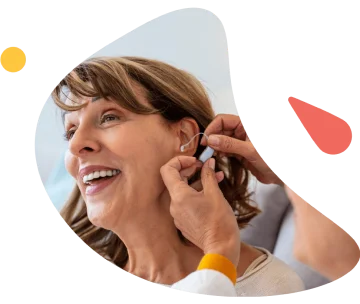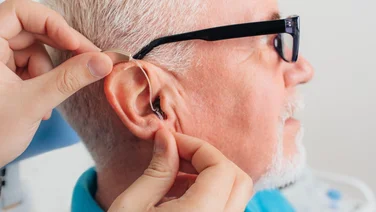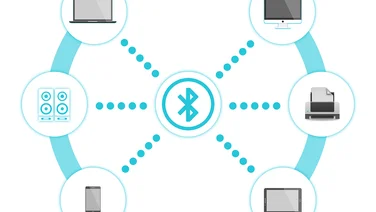Legislation was passed in the United States that allows adults with perceived mild to moderate hearing loss to buy hearing aids over the counter from pharmacies, large stores, and online retailers.
Previously, hearing aids were only available with a prescription, which is receive after you’ve had your hearing tested and the hearing aid fitted and adjusted by a hearing health professional, such as an audiologist.
What are the best hearing aids available over the counter?
What are over-the-counter hearing aids?
Over-the-counter (OTC) hearing aids are, as the name suggests, hearing aids you can buy over the counter, directly from a store or pharmacy without needing a medical exam, a prescription, or any input from a hearing health professional.
They are a new category of hearing aids that are regulated as medical devices by the Food and Drug Administration (FDA).
OTC hearing aids are designed to amplify sounds to make them clearer. As a result, you’re better able to hear many types of sounds, making it easier to listen and communicate, often improving your everyday life.
Whether you buy them in person or online, you fit and tune OTC hearing aids yourself. If the hearing aid has different settings for different listening environments – watching TV versus sitting in a crowded coffee shop, for example – you will control these as well.

Who are over-the-counter hearing aids for?
OTC hearing aids are only suitable for adults with perceived mild to moderate hearing loss. As such, an OTC hearing aid isn’t likely to help if you have severe hearing loss, and they are not suitable for children.
Under-18s and people with severe or profound hearing loss may benefit from a prescription hearing aid, which is only available from hearing health professionals.
‘Perceived hearing loss’ means you or a loved one have noticed some problems with your hearing, but you haven’t necessarily had your hearing tested or received a formal diagnosis of hearing loss.
It doesn’t mean you can’t have your hearing tested by a professional, like an audiologist, or that you’re not able to get a prescription hearing aid.
What is mild to moderate hearing loss?
People experience hearing loss differently, but as a rule of thumb, if you have mild or moderate hearing loss you may notice the following:
- Speech is sometimes difficult to distinguish, especially if it’s soft or high-pitched
- Certain sounds, including speech, seem muffled
- It’s difficult to hear when you’re in a group, on the phone, or if you’re in a noisy environment
- You frequently find yourself asking people to repeat themselves or to speak louder
- When you’re watching TV or listening to music, for example, you need to increase the volume to a level other people aren’t as comfortable with
We can help set you up with an audiologist
Fill in our quick form and we'll connect you for free advice
What are the advantages of OTC hearing aids?
Hearing aids can be very expensive. While some people are eligible for financial assistance to help with the costs of buying and maintaining hearing aids, many aren’t.
The US FDA’s ruling in August 2022 allows for the purchase of hearing aids over the counter without a prescription, with the intention of lowering the costs of hearing aids.
It is part of the US government’s goal to make high-quality health care more accessible for millions of people. The clear advantage is that many consumers now have access to hearing loss treatments.
Because they are classed as medical devices, OTC hearing aids are now regulated by the FDA. This means manufacturers must make sure their devices are safe and effective.
There is also a set standard for packaging and labels, making it easier for consumers to understand who could benefit from OTC hearing aids and who they are not suitable for. Labels also need to include warnings and information that buyers should know before making a purchase or wearing the hearing aid, such as when you should see a doctor about hearing loss.
Note that the legislation does not apply to personal sound amplification products (PSAPs), which are not classed as medical devices. PSAPs are for people without hearing loss to amplify sounds in specific environments.
A knock-on benefit of the OTC hearing aid ruling is that it will foster competition between manufacturers of hearing technology products. It is hoped that this will provide consumers with more choice as well as drive down the cost of hearing aids.
Another advantage of over-the-counter hearing aids is that you have complete control over your hearing aids, and won’t need a hearing health professional to intervene to adjust the settings.
Currently, just one in four adults who could benefit from wearing hearing aids has used them, despite the fact that untreated hearing loss is linked with isolation, depression, dementia, and falls. It is thought that the stigma associated with hearing loss, as well as the cost of treatment, are barriers that stop people from seeking help.
Having access to hearing aids without needing to visit a doctor first is likely to encourage more people to come forward and seek treatment. This can prevent many people from living with hearing loss and the complications associated with it.
What are the drawbacks of OTC hearing aids?
The main disadvantage of over-the-counter hearing aids is that they are essentially a one-size-fits-all option for a problem that requires an individual approach. Unlike prescription hearing aids, you cannot have them custom-made, so they might not fit exactly as they should.
They are not intended to be used by children, nor by adults with severe or profound hearing loss. So, it’s up to you to determine how significant you perceive your hearing loss to be, and if your hearing loss is more severe, you won’t get much benefit from OTC hearing aids.
More notably, there are certain scenarios in which it’s important to consult with a doctor or hearing health professional before deciding to buy over the counter.
- Your hearing loss is very severe
- You have sudden-onset hearing loss or it has worsened very quickly
- You have pain or discomfort, or fluid or pus coming from your ear
- You experience dizziness alongside your hearing loss
- You have had a problem with excess ear wax in the past
- You might have something stuck or lodged in your ear canal
- You have hearing loss and/or tinnitus only in one ear
- Your hearing loss fluctuates over time – it gets worse then better
- You have previously had ear infections
There are other, non-medical reasons why over-the-counter hearing aids may not be suitable for you.
For example, if you have poor eyesight or difficulty with fine motor skills, you might find it hard to adjust and manage the controls of a hearing aid.
Doing so may also require a level of technological know-how: if you are not very savvy when it comes to hearing technology, you may be better off seeking the help of a professional.
If you are unsure whether your hearing loss is mild or more severe, it is advised that you have your hearing checked before buying a hearing aid. This will help you to determine the best option for you, and will prevent you wasting time and money on hearing aids that might not improve your hearing.
Whatever your circumstances, it is a good idea to have your hearing tested by a qualified professional. We can help with this – simply fill in our short form and we’ll connect you with some of the leading audiologists in your area.
What should I look out for when buying OTC hearing aids?
If you are thinking about investing in over-the-counter hearing aids, there are a few things to bear in mind. As FDA-regulated medical devices, they must be safe and effective and meet certain packaging requirements. You should check:
- Does the packaging explain who might benefit from wearing the hearing aids, and who they are not suitable for?
- Does it outline when you should seek medical advice for your hearing loss and/or related symptoms? It’s important to see a doctor if you are experiencing pain, discharge, sudden hearing loss, or dizziness.
The Hearing Loss Association of America (HLAA) has compiled a ‘shopping list’ of questions to ask when buying over-the-counter hearing aids.
- Does the hearing aid come with a free trial, or is there a return policy that gives you your money back if you’re not satisfied?
- Can its volume or amplification be adjusted?
- Does it have controls for minimizing background sounds or noise from the wind?
- Does it use rechargeable batteries? If so, how long is the battery life?
- Does it use replacement batteries? If so, what size and how often do they need to be replaced?
- Is it water resistant?
- Does it have Bluetooth or telecoil capabilities?
- Is it compatible with smartphones – iOS and Android?
- Does it require connectivity to an app to install or customize it?
As well as finding out as much as you can about hearing aids you’re considering buying, you should also bear in mind it will likely take time to get used to wearing hearing aids.
Whether you’re purchasing hearing aids over the counter or on prescription, it’s important to be patient and give it time.
Ultimately, having the expertise and input from a hearing health professional can help you to find the right hearing solutions for you, and support you through your hearing loss journey.
Not sure which hearing device will be best for you?
We can help. We work with trained audiologists to get you the advice you need








